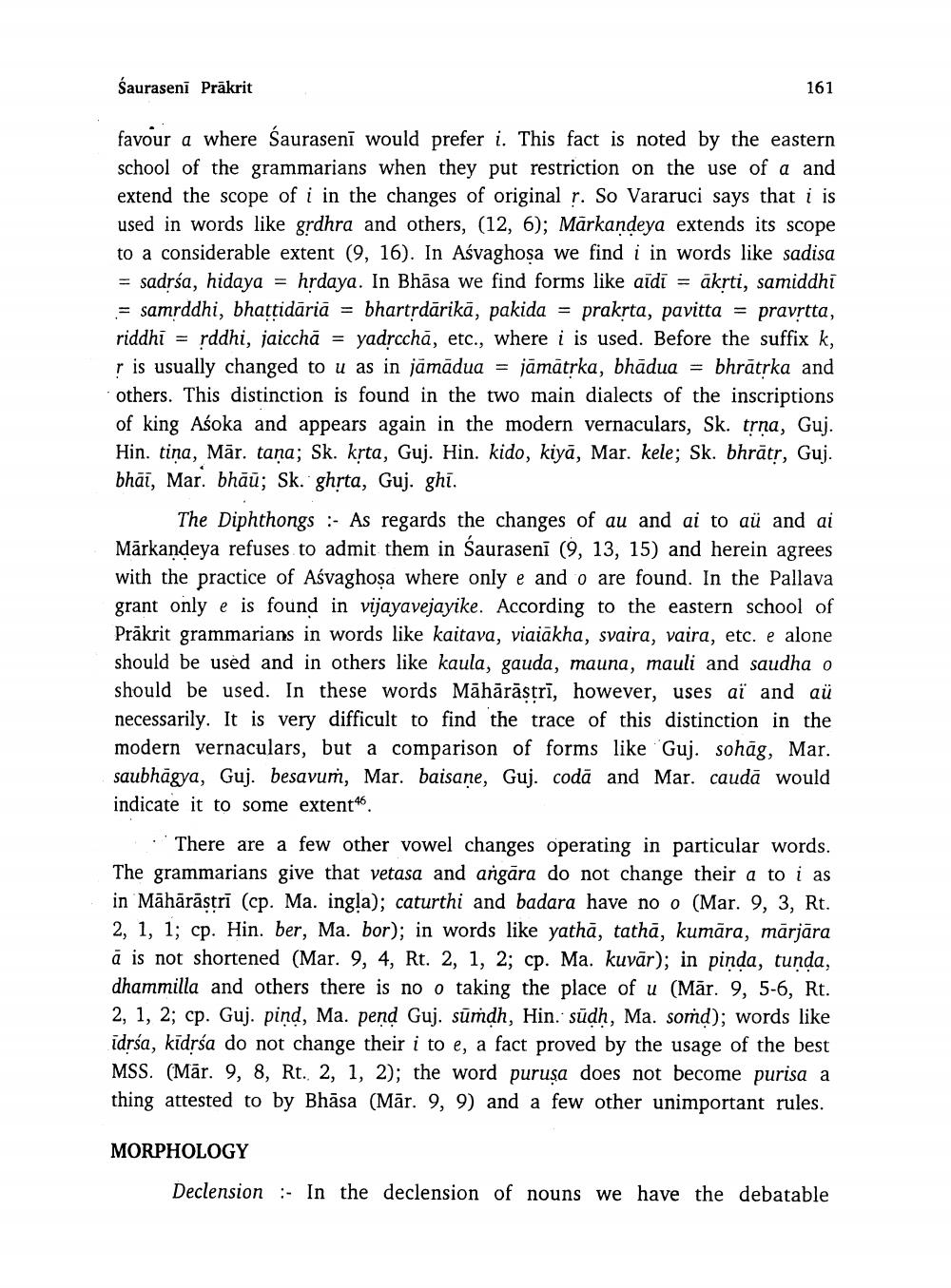________________
Sauraseni Prākrit
161
favour a where Saurasenī would prefer i. This fact is noted by the eastern school of the grammarians when they put restriction on the use of a and extend the scope of i in the changes of original r. So Vararuci says that i is used in words like grdhra and others, (12, 6); Markandeya extends its scope to a considerable extent (9, 16). In Asvaghosa we find i in words like sadisa = sadrśa, hidaya = hrdaya. In Bhāsa we find forms like aidi = akrti, samiddhi = samrddhi, bhattidária = bhartsdārikā, pakida = prakrta, pavitta = pravrtta, riddhi = rddhi, jaicchā = yadrcchā, etc., where i is used. Before the suffix k, r is usually changed to u as in jāmādua = jāmātrka, bhādua = bhrātrka and others. This distinction is found in the two main dialects of the inscriptions of king Aśoka and appears again in the modern vernaculars, Sk. trna, Guj. Hin. tiņa, Mār. tana; Sk. krta, Guj. Hin. kido, kiya, Mar. kele; Sk. bhrāts, Guj. bhāi, Mar. bhāū; Sk. ghrta, Guj. ghi.
The Diphthongs :- As regards the changes of au and ai to aü and ai Mārkandeya refuses to admit them in Sauraseni (9, 13, 15) and herein agrees with the practice of Aśvaghosa where only e and o are found. In the Pallava grant only e is found in vijayavejayike. According to the eastern school of Prākrit grammarians in words like kaitava, viaiakha, svaira, vaira, etc. e alone should be used and in others like kaula, gauda, mauna, mauli and saudha o should be used. In these words Māhārāstrī, however, uses aï and aü necessarily. It is very difficult to find the trace of this distinction in the modern vernaculars, but a comparison of forms like "Guj. sohāg, Mar. saubhāgya, Guj. besavum, Mar. baisane, Guj. codā and Mar. caudā would indicate it to some extent 46.
There are a few other vowel changes operating in particular words. The grammarians give that vetasa and angāra do not change their a to i as in Māhārāstri (cp. Ma. ing!a); caturthi and badara have no o (Mar. 9, 3, Rt. 2, 1, 1; cp. Hin. ber, Ma. bor); in words like yathā, tathā, kumāra, mārjāra a is not shortened (Mar. 9, 4, Rt. 2, 1, 2; cp. Ma. kuvār); in pinda, tunda, dhammilla and others there is no o taking the place of u (Mār. 9, 5-6, Rt. 2, 1, 2; cp. Guj. pind, Ma. pend Guj. sümdh, Hin. südh, Ma. somd); words like idrśa, kīdṛśa do not change their i to e, a fact proved by the usage of the best MSS. (Mār. 9, 8, Rt. 2, 1, 2); the word puruşa does not become purisa a thing attested to by Bhāsa (Mār. 9, 9) and a few other unimportant rules.
MORPHOLOGY
Declension :- In the declension of nouns we have the debatable




